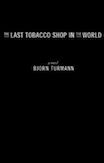2010 books

23) Bjorn Turmann, The Last Tobacco Shop in the World, 2010
Just occasionally the novels you discover at airports are not your typical airport novels. They tease you with nondescript jacket designs and instead draw you in with a well-written cover blurb. They're wrapped in cellophane or produced by a very small publishing house, or they come in very limited print runs. In the case of The Last Tobacco Shop in the World, all the above apply. Looking online, the book also has its own rather enigmatic blog, and on the day this book was published its author Bjorn Turmann also published the non-fiction work Speaking Energy: Public Speaking for Humans... Finally! He also has two other mainstream South-East Asian novels under his belt, Good Daughter and The Karaoke World of Cortous Haire. He's also a co-founder of the company that produced the visual effects for last year's unexpected hit SF movie District 9. This Canadian with a Scandinavian name but living in Asia is clearly a hard person to delineate, creatively speaking: perhaps he's someone with several muses, but with a knack of producing work that, somehow, also engages unorthodox ways of attracting attention.
Just a few chapters into The Last Tobacco Shop in the World I felt I'd discovered an unexpected and original take on the future - one in which natural disasters are created as aphrodisiacs, in which smokers are hunted down and killed, in which interior lighting has the ability to sense human needs. My interest was sustained for over 300 pages mostly because of the tight and interesting way Turmann has with dialogue, particularly between strangers getting to know each other: they talk obliquely to produce conversations that zig-zag their way to their point. There are also some very neat future ideas in this story, set in the year 2040 on a new island called Jarangwa, a tiny slice of post-tsunami geological apocalyptica thrown up by the Andaman Sea off Thailand in 2004. Anton Brick is a freelance 'syrup monkey', chasing down ever-diminishing fringe supplies of oil in Iraq, then while staying in Cambodia he's offered, and takes, a PR job at the only hotel on Jarangwa, one of the few places on Earth where it's still entirely legal to smoke tobacco. The rest of the planet is a mess of plagues and worldwide Orwellian governmental forces that have banned love, premarital sex, small firearms (big firearms being harder to conceal) and, of course, smoking. But Anton discovers that the guests at this hotel are an unusually strange crowd (including a repentant ex-spammer and a Mongolian ex-prostitute, by far the most interesting and well-drawn character), some with frightening personal ambitions and dangerously complex personalities.
Plot and setting aside, Turmann's obvious strength is his dialogue. It's the aspect of this novel that ensured I became completely drawn into it, sometimes making me feel a little trapped inside, Prisoner-like, as I tried to figure out where this small cast of ill-matched characters was heading: occasionally I felt like the protagonist Anton, a blank slate always being kept a little in the dark and always well out of his depth. This is an enigmatic and slightly twisted novel, more slipstream than science fiction, and it's also one of the most off-beat books I've read for a long time. It kept me reading less for its distinct strangeness, which is actually understated, and more for its promise, which is considerable. It has one obvious geographical error (and a rather unforgivable one as it's relevant to the plot) which is that a boat cannot get from Cambodia's Rabbit Island to Phuket unless it circumnavigates the entire Malay Peninsula, a journey that could not be done in a day - for convenience Turmann seems to have somehow located Phuket and the Andaman Sea on the other side of Thailand. That problem notwithstanding, as I write there are only 600 copies of Tobacco Shop in the world, but there ought to be thousands more as in my opinion this novel certainly deserves the interest of a bigger publisher.